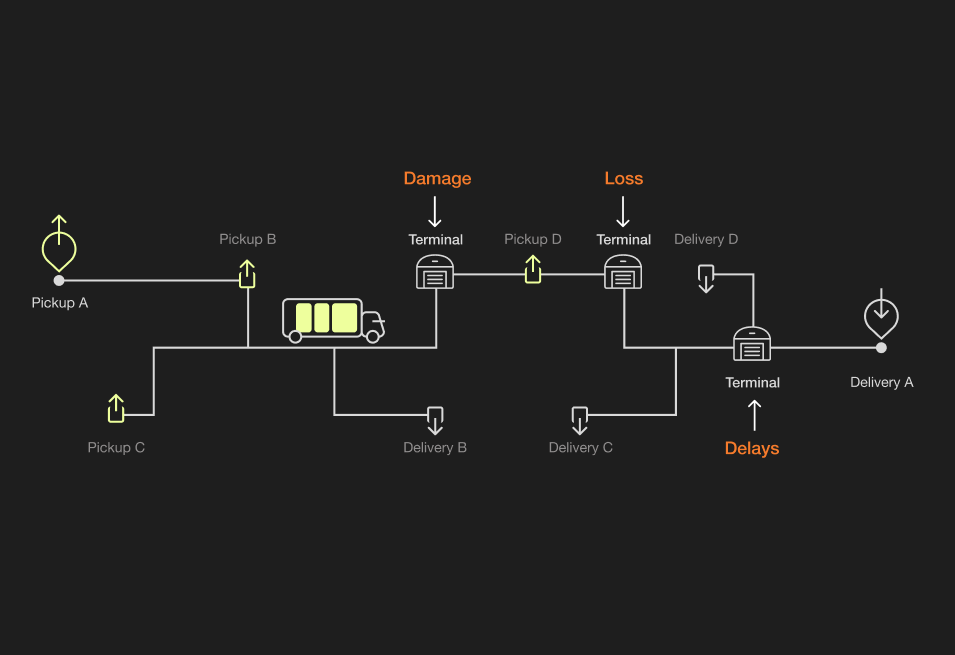How to Avoid Cargo Fraud and Theft

The freight shipping industry is integral to the functioning of the global economy, underpinning trade flows, supporting livelihoods, and driving innovation. New technologies within the logistics sector are making it even more efficient, but they’re also making it easier for bad actors to steal goods, thanks to increasing threats of fraud, theft, and cybercrime.
Cargo theft and freight fraud are often carried out by sophisticated crime networks with vast knowledge and resources, making it extremely difficult for companies to combat. Flock Freight’s proactive approach to cargo security—including advanced carrier vetting, comprehensive insurance protection, and a culture of cybersecurity—can help mitigate these risks.
The Growing Importance of Cargo Security in Freight Shipping
Ensuring that goods reach their destination safely is critical to maintaining a smooth and trustworthy supply chain. Unfortunately, the freight industry saw a 430% YoY increase in documented strategic cargo theft events in the third quarter 2023, and 89% of shippers were impacted by theft or fraud throughout that year. States like California and Texas have seen particularly sharp increases, with Southern California especially vulnerable due to its ports and cross-docks.
One factor poised for this increase is inflation, with higher-valued goods being a more tantalizing draw. Another is the vast digitization across the supply chain, leaving shippers vulnerable to cyberattacks. As the industry has evolved from paper-and-pen processes to more efficient and sophisticated ones, so, too, have the tactics of cargo fraud and theft. Traditional methods, like double-brokering and breaking and entering, have increasingly changed to tech-savvy deceptions at several points across the supply chain.
“Strategic” cargo theft involves fraudulently tricking a company into relinquishing their goods. Examples include using imposter identities and fake postings to facilitate fictitious pick-ups; cluster thefts, where scammers obtain account information to pose as legitimate companies and steal multiple loads simultaneously; the creation of counterfeit web domains for ghost shipments that don’t exist; and strategic pilferage, where thieves digitally alter the documents to make shipments appear smaller, then keeping the hidden goods for themselves.
Financial and Operational Impacts of Cargo Theft and Fraud
The impacts of freight fraud and cargo theft go beyond the loss of goods. There are myriad financial implications of cargo fraud schemes, as well as operational disruptions and damage to a business’s reputation.
Direct Financial Losses
Across all reported cargo thefts in 2023, the industry lost nearly $700 million in stolen goods, with the average loss from each theft coming to $586,917. The most obvious financial hits include the physical loss of high-value goods and the associated replacement costs. But other contributing factors include:
- Criminal investigation and recovery costs
- Reduced earnings due to sales losses
- Unexpected fines and fees
- Costly insurance claims and higher premiums
- Heightened security costs
- Expedited shipping costs for replacement items or components
Operational Disruptions
Cargo theft can lead to significant delays and disruptions throughout the supply chain. Missing components can cause manufacturing and product launch delays, as well as product recalls. Lost inventory necessitates the production of new items while existing orders wait for fulfillment, creating a backlog and leading to delivery delays. Increased security requirements may result in rerouting, thereby decreasing shipping efficiency and increasing the potential for even longer delivery timelines.
Brand and Customer Trust
The aforementioned issues associated with cargo theft can harm not only a company’s bottom line but also its vendor and customer relationships. If a business is perceived to be unable to protect its products sufficiently, they have a high likelihood of losing customers and, subsequently, losing sales. This reputational damage after security breaches has the potential to be long-term.
Types of Insurance Coverage for Freight Shipping
The best way for companies to mitigate these financial, operational, and reputational risks is to invest in comprehensive freight insurance policies that offer coverage against cargo theft and fraud. Types of freight insurance coverage include:
- Cargo insurance: Cargo insurance covers the value of the goods being shipped and protects against perils that occur during transit, such as loss, theft, physical damage, and non-delivery of goods.
- Theft insurance: These theft-specific policies offer shipment protection beyond what broader cargo insurance covers, especially in high-risk areas or when transporting especially high-value goods.
- All-risk shippers insurance: This broad coverage safeguards against damage or loss from external factors—such as a heavy storm, fire, or collision—that may not be covered by a carrier or broker. With an all-risk policy, shippers don’t have to prove carrier liability and can recoup their losses regardless of fault.
- Fraud insurance: This type of coverage offers protection against fraud schemes like false contracts, non-payments due to bounced checks or fake payment proofs, and other fraudulent claims by bad actors.
These insurances often work together to offer comprehensive coverage for shippers, carriers, and logistics providers, combating cargo theft and fraud from every angle. That said, they’re also a last line of defense, as they only cover you after an incident. And once that happens, your premiums can rise, as the insurers incur financial losses as well.
Cybersecurity and Fraud Prevention in Freight Shipping
As the supply chain has shifted further into digitization, cyber attacks targeting logistics companies have increased in both frequency and variety. Cybercriminals use phishing, ransomware, and other types of cyber fraud to steal critical information, including company financials, account and login credentials, sensitive customer information, and more. Often conducted by organized crime units and digital gangs, cybercrime and data breaches can lead to service outages, fraudulent pickups, loss of goods, and significant delays.
In addition to theft of goods and services, cyber attacks can potentially target the vehicles themselves. As telematics devices and IoT-based systems significantly increase shipping efficiency and visibility, they also leave companies and vehicles vulnerable to hacking and ransomware attacks.
A growing type of protection against freight fraud is cyber insurance. This additional coverage helps cover liability for things like network and data breaches, lost income due to cyber fraud, costs for system repairs, cyber extortion, and more. It often includes litigation and forensic investigation expenses, as well as coverage for regulatory fines incurred as a result of cybercrime.
Continuous Improvement in Security
Any freight company must be proactive with risk management for cargo theft and fraud. At Flock Freight, we’re constantly upgrading and enhancing our layered software stack, leveraging several advanced tools and systems to mitigate risks. Some of these include:
- Digital Risk Management, a new concept in cybersecurity operations that Flock Freight has created to ensure platform security by monitoring user behavior, carrier registrations and advanced algorithms that proactively alert potential risky user behavior so that our team of risk experts can address the problem before it escalates.
- Carrier Onboarding, Flock uses an innovative carrier onboarding platform that focuses on establishing carrier identity, continuous monitoring, crowdsourcing identity alerts and fraud prevention specifically designed for digital booking platforms.
- Real-Time Asset Tracking, Flock uses freight intelligence technology that offers real-time data and enhanced visibility to combat double-brokering and better monitor shipments at any point in transit; this also provides Flock Freight deeper insights into carrier quality in addition to real-time tracking.
Flock Freight also offers best-in-class Carrier ID verification through our partners; this allows Flock to take active steps to disqualify carriers who fail to meet rigorous standards. Only confirmed FMCSA contacts can complete application packets, forcing them to prove who they are. These standards help reduce risks before they escalate and ensure that only thoroughly vetted carriers are allowed into the Flock platform.
Flock Freight’s Commitment to Safeguarding Shipments
At Flock Freight, fraud prevention and cybersecurity are key priorities. Our commitment to protecting customer shipments is evident through stringent security measures and innovative technologies.
The Flock platform’s security measures include two-factor authentication (2FA) for all users—carriers and employees alike. Our systems are subject to proactive fraud monitoring and reporting to flag suspicious activity, and we’re protected by Crowdstrike to detect and address fraud and cyber threats.
Our FlockDirect® Shared Truckload (STL) service keeps shipments moving continuously on a direct route, eliminating hub-and-spoke terminals. Cargo never leaves the truck, reducing the opportunities for straight theft in transit. In addition to ensuring minimal theft rates, FlockDirect® includes strict insurance and carrier liability requirements, including cargo insurance coverage of up to $100,000, plus $1 million in auto liability and 90 days minimum of in-service authority.
Cybersecurity is also embedded in Flock Freight’s culture. Our in-house IT Security Committee meets regularly to conduct assessments and respond to cybersecurity risks, and all employees undergo Knowbe4 cybersecurity training and programs to educate and raise awareness about cybersecurity risks and best practices.
Conclusion
With such a drastic spike recorded in cargo theft over the last year, it’s more critical than ever for businesses to be proactive in shielding themselves from fraudulent activities. Flock Freight’s comprehensive approach to securing shipments includes a combination of cyber security initiatives, advanced carrier vetting, continuous monitoring, and strong insurance policies.
Fraud and theft insurance is a vital layer of protection for the freight shipping industry; with Flock Freight you can trust that not only is your cargo safer traveling with truckload protection, but it’s also covered by strict insurance requirements to help you maintain seamless operations. Get a demo today to see how Flock Freight’s innovative solutions can safeguard your business while increasing efficiency and reliability.




